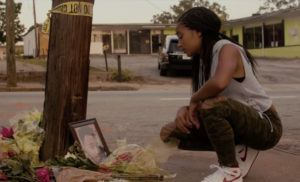The Hate U Give
Posted on October 4, 2018 at 5:42 pm
A-| Lowest Recommended Age: | Middle School |
| MPAA Rating: | Rated PG-13 for mature thematic elements, some violent content, drug material and language |
| Profanity: | Some strong language |
| Alcohol/ Drugs: | Teen drinking, drug and drug dealing references |
| Violence/ Scariness: | Intense peril and violence, teenager killed by a police officer |
| Diversity Issues: | A theme of the movie |
| Date Released to Theaters: | October 5, 2018 |
| Date Released to DVD: | January 21, 2019 |

“The Hate U Give” is one of the best and most important films of the year. Angie Thomas’ best-selling novel about a girl named Starr has become a profound and profoundly moving film. It is an of-this-moment, vitally urgent story about race, culture, and America in 2018, but it is also a deeply human, deeply moving exploration of the most universal themes: family, identity, growing up, forgiveness, and finding your voice.
The incandescent young actor/activist Amandla Stenberg (Rue in “The Hunger Games”) plays Starr, the middle child and only daughter in a loving family. She is completely at home in their neighborhood of Garden Heights. But you can get “jumped, high, pregnant, or killed” at the local high school, and so she and her older brother attend a private school called Williamson, where most of the students are white and wealthy. She calls the version of herself they see “Starr version 2.” When the white kids sing along to hip hop or use black slang, she smiles politely but knows that if she does the same thing she will appear too “ghetto.” But she has a nice (white) boyfriend named Chris (K.J. Apa), and some nice white girl friends she can complain to when Chris tried to push her into having sex.
At a party in Garden Heights, she feels more at home, but some of the people there are suspicious of her for possibly “acting white.” She runs into an old friend, Khalil (Algee Smith) and he offers to drive her home. As children, they played Harry Potter together with a third friend, but they have fallen out of touch. Starr can tell from his very expensive, mint-condition shoes that he may be in trouble. Khalil has begun to deal drugs because it is the only way he can support his ailing grandmother.
They are stopped by a white policeman who thinks that Khalil is reaching for a weapon and shoots him. Starr sees it all. Starr is devastated. And she begins to see herself and her world differently. The Williamson students walk out of school to protest in support of Black Lives Matter — or to get out of school. Starr’s friend stops following her on Instagram because Starr connects the killing of her friend to tragic injustices like the murder of Emmett Till.
As we see in the opening scene, Starr has been told since she was a child how to respond to law enforcement. As we will learn later, this is not the first time she has lost someone close to her to violence. As she has to decide whether she will tell the truth about what she saw, putting her Williamson persona at risk and, because of Khalil’s involvement with a powerful neighborhood drug dealer, putting her family and her community at risk as well.
Every performance in the film is a gem, especially Regina Hall (“Support the Girls”) and Russell Hornsby (“Fences”) as Starr’s parents and Stenberg herself, who has extraordinary screen charisma and a remarkable control of detail to show us how Starr begins to integrate the separate versions of herself. The film brings in a remarkably nuanced range of perspectives, especially in two standout scenes: Starr talking to her police officer uncle (Common) about the ways he sees black and white suspects, and Starr talking to her mother about forgiveness. Every element of the story is handled with sensitivity, respect, and a deep humanity, from the specifics of Starr’s relationships to the big themes of how we interact with the world and how we work for change. This is a rare film that does justice to the characters and the themes as it reminds us that we can all do more to bring justice to the world.
Parents should know that this film includes an unarmed character shot by a police officer, peril and violence, protests, guns, vandalism, arson, some teen partying, drug dealing, and some strong language
Family discussion: Should Starr speak out? What are the risks and how can she best make a difference? How can you?
If you like this, try: “Boyz n the Hood,” “Do the Right Thing,” “Fruitvale Station,” “Blindspotting,” and the book by Angie Thomas
